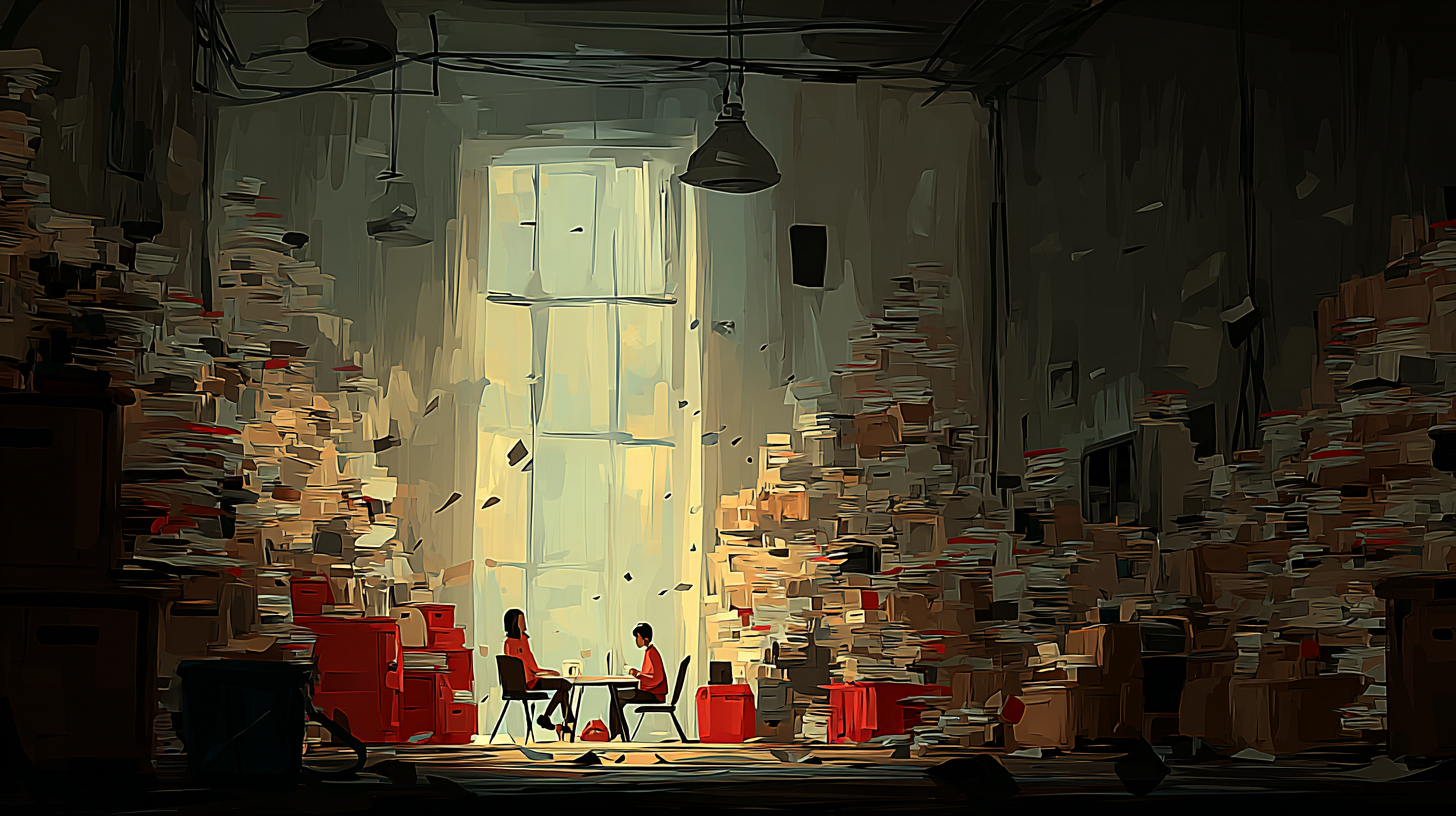“Rubbish” means trash or something not useful or not good.
rubbishは、「ごみ」や「つまらないもの」を意味します。
以下は英単語 “rubbish” に関するストーリー型学習コンテンツです。まずは大枠の意味を理解して最後の文章で確認しましょう。
「rubbish」の主な意味(main meaning)
| 品詞 | 意味 | 発音記号 | 英語例文 |
|---|---|---|---|
| 名詞 | ごみ、くだらないもの | /ˈrʌb.ɪʃ/ | I threw the old newspapers into the rubbish bin. |
| 形容詞 | くだらない、役に立たない | /ˈrʌb.ɪʃ/ | That was a rubbish idea from the start. |
| 動詞(英) | ごみとして捨てる、酷評する | /ˈrʌb.ɪʃ/ | He rubbished my suggestion without even listening. |
- 「rubbish」は 「ゴミ」 の意味が基本ですが、「価値がない/ひどい/ダメ」 という意味でもよく使われます。
- 英語圏では特に英国英語で多く使われ、アメリカ英語では同じ意味で trash や garbage が使われることがあります。
- 『この意見は rubbish だ』というように、意見や考えを「ダメだ」と言う時にも使える便利な表現です。
「rubbish」の語源(etymology)
「rubbish」は中世フランス語 “robouse” に由来し、「壊れたもの」「がれき」という意味がありました。基本的なイメージは「役に立たないもの」「捨てるべきもの」です。
「rubbish」の類義語(synonyms)
| 類義語 | 英語例文 |
|---|---|
| garbage | Please take out the garbage before it smells. |
| trash | He threw the broken toy into the trash. |
| waste | We should reduce food waste. |
| junk | This old TV is just junk now. |
| nonsense | What he said was complete nonsense. |
「rubbish」の反義語(antonyms)
| 反義語 | 英語例文 |
|---|---|
| treasure | This necklace is a family treasure. |
| value | Education has great value in society. |
「rubbish」のコロケーション(collocations)
| コロケーション | 英語例文 |
|---|---|
| rubbish bin | She threw it into the rubbish bin. |
| talk rubbish | Stop talking rubbish and listen. |
| clear out the rubbish | We cleared out the rubbish from the garage. |
| full of rubbish | His speech was full of rubbish. |
| collect rubbish | The workers collect rubbish every Monday. |
「rubbish」の2項表現(binomials)
| 表現 | 英語例文 |
|---|---|
| bits and pieces | I found some bits and pieces of old rubbish. |
| odds and ends | The drawer was filled with odds and ends. |
英語ストーリー(english story)
Title: The Office Cleanup Day
It was Friday morning, and Mr. Parker, the manager of the sales team, announced, “Today is cleanup day!” The office was full of rubbish—old papers, broken pens, empty boxes, and things nobody used anymore.
Jenny looked around and sighed. “This place is full of junk,” she said. “Let’s start with the storage room.”
Mark joined her. “We should clear out the rubbish bin first. It’s completely full.”
As they worked, Jenny found an old coffee maker. “Should we throw this away?”
Mark laughed. “That thing is total rubbish. It doesn’t even work.”
While they cleaned, Tom walked by and started to talk rubbish about how his desk was already perfect. “I keep everything neat and clean,” he said.
Jenny rolled her eyes. “Stop talking rubbish, Tom. I’ve seen your desk!”
Meanwhile, the janitor came by to collect rubbish. “You’ve got a lot today,” he said. “Looks like you’re throwing away all the odds and ends.”
At the end of the day, the office looked much better. Mr. Parker smiled. “Well done, everyone. You’ve turned waste into value.”
Jenny nodded. “It feels good. Like we found some treasure under all that mess.”
和訳
タイトル:オフィスの掃除の日
金曜日の朝、営業チームのマネージャーであるパーカーさんが言いました。「今日は掃除の日です!」
オフィスは**rubbish(ごみ)**でいっぱいでした。古い紙、壊れたペン、空の箱、誰も使っていない物たち。
ジェニーはあたりを見回してため息をつきました。「ここ、完全に**junk(がらくた)**だね。」
「まずは倉庫から始めよう。」
マークも手伝いに来ました。「まず**rubbish bin(ごみ箱)**を空にした方がいいね。パンパンだよ。」
掃除中、ジェニーは古いコーヒーメーカーを見つけました。「これ、捨てちゃう?」
マークは笑いました。「それ、完全に**rubbish(くだらないもの)**だよ。もう動かないし。」
掃除していると、トムが来て、自分の机は完璧だとか、いろいろ**talk rubbish(くだらないことを話す)**し始めました。
「俺の机はいつもきれいだし整ってるんだ。」
ジェニーは目を回しました。「**rubbish(でたらめ)**言わないでよ、トム。あなたの机見たことあるよ!」
その間に清掃員が来て**collect rubbish(ごみを回収)しました。
「今日は多いですね。いろんなodds and ends(がらくた)**を捨ててるみたいですね。」
一日の終わりにはオフィスはずっときれいになりました。パーカーさんはにっこりして言いました。
「よくやった。**waste(無駄)をvalue(価値)**に変えたね。」
ジェニーはうなずいて言いました。「気持ちがいいね。全部の下から**treasure(宝物)**を見つけたみたい。」
「rubbish」のQ&A
- Q「rubbish」と「garbage」の違いは何ですか?
- A
どちらも「ごみ」を意味しますが、「rubbish」はイギリス英語、「garbage」はアメリカ英語でよく使われます。
- Q「rubbish」と「trash」はどちらも使えますか?
- A
はい、意味はほぼ同じです。「rubbish」はイギリス英語で、「trash」はアメリカ英語で一般的に使われます。
- Q「rubbish」と「junk」の違いはありますか?
- A
「rubbish」は捨てるべきごみ全般を指しますが、「junk」は壊れて使えなくなったものやがらくたを指すことが多いです。
- Q「rubbish」と「nonsense」の関係は?
- A
「nonsense」は「ばかげたこと」や「でたらめ」という意味で、比喩的に「rubbish」と似ています。たとえば、人の話がくだらないときに「That’s rubbish」と言うことがあります。
- Q「rubbish」と反対の意味の単語はありますか?
- A
「treasure(宝物)」や「value(価値)」が反対語として挙げられます。どちらも「大切にすべきもの」を意味します。
- Q「rubbish bin」はどんな意味ですか?
- A
「rubbish bin」は「ごみ箱」という意味で、特にイギリス英語でよく使われます。アメリカ英語では「trash can」が一般的です。
- Q「talk rubbish」とはどういう意味ですか?
- A
「意味のないこと」や「でたらめなこと」を話すという意味です。人の意見が信じられないときに使われます。
- Q「clear out the rubbish」はどう使いますか?
- A
「ごみを片づける」「掃除して不要なものを捨てる」という意味で、家庭やオフィスの整理の時によく使います。
- Q「full of rubbish」はどういうときに使いますか?
- A
文字通り「ごみでいっぱい」という意味のほかに、「内容がくだらない」「信じられないほどひどい」という意味でも使われます。
- Q「collect rubbish」は誰がすることですか?
- A
「collect rubbish」は「ごみを回収する」という意味で、主に清掃員や回収業者が行う行為を指します。
| 単語 | わかりやすい意味 | よく使う場面 | 「rubbish」との違い | 英語例文 | 日本語訳 |
|---|---|---|---|---|---|
| rubbish | ゴミ、くだらない物・意見 | イギリス英語圏/口論や批判でも使う | 英国英語中心で「価値がない」意味もあり | Don’t talk rubbish! | バカなこと言うな! |
| trash | ゴミ、くず | アメリカ英語の日常表現 | 使い捨ての軽いゴミ(紙・袋など)中心 | Throw the trash in the bin. | ゴミ箱にくずを捨てて。 |
| garbage | 生ゴミ、ごみ | アメリカ英語で特に台所の生ゴミに多い | 食べ物のゴミを含む家庭ごみに多く使う | Take out the garbage, please. | ゴミ出してきてください。 |
| junk | ガラクタ、古くて使えない物 | 古い電化製品・壊れた家具など | 重くてかさばる、売れない物の印象 | We cleaned the garage and threw away all the junk. | ガレージを掃除してガラクタを全部捨てた。 |
違いのまとめ
- rubbish:イギリス英語で使う「ゴミ」や「くだらない物・考え」。
- trash:アメリカでよく使う「軽いゴミ」(紙・空き缶など)。
- garbage:アメリカで使う「生ゴミ」。キッチンのごみ袋に入れる物。
- junk:古くてもう使えない大きな物(家具・電化製品など)。



コメント